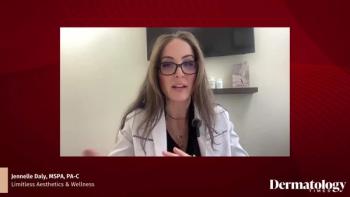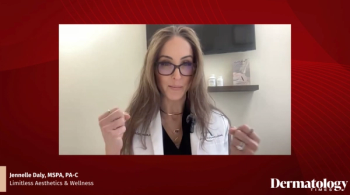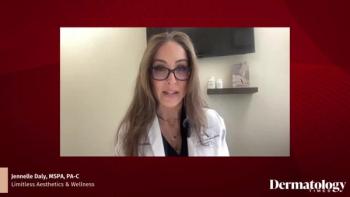
Latest News on Atopic Dermatitis in Children
At Maui Derm NP+PA Fall 2021, Vikash S. Oza, MD, and Matthew J. Zirwas, MD, discuss the current Rx and Dx of atopic dermatitis in children.
Can we prevent atopic dermatitis in children going forward? When should you question your diagnosis? What is in the pediatric pipeline for this condition? These were some of the questions posed by Vikash S. Oza, MD, associate professor, Dermatology and Pediatrics, Ronald O. Perelman Department of Dermatology, NYU Grossman School of Medicine in New York City, Maui Derm NP+PA Fall 2021 conference.1
Oza began his presentation with a reminder that AD is a prevalent childhood condition, with the largest incidence showing in children 3 to 5 months of age (14%-25%), followed by 5 to 18 years (11%) 2,3. “It has a quality of life [QoL] impact and symptoms may not be stable over time,” Oza noted. The impact of prevention goes far beyond AD itself, as oral exposure can affect the gastrointestinal (GI) tract, while cutaneous exposure can impact Th2 memory cells.
In terms of prevention, Oza said studies have shown how emollient enhancement of the skin barrier from birth can be an effective AD and eczema deterrent. Oza also pointed to bathing frequency associative to AD, with infants at 3 months old (with no known predilection for AD) who bathed daily having a 60% greater chance of getting AD than those who bathed once a week.4
Other preventive measures included checking water quality (hard water had a strong correlation with AD), breast feeding (exclusive breast feeding in the first 4 months reduced AD prior to 2 years), and prenatal and postnatal probiotic use.
When questioning diagnosis, Oza said, “AD red flags include early infancy erythroderma, poor response to topical corticosteroids, atypical distributions, and multiple, early-in-life infections.”
Looking at additions to the current pediatric armamentarium and pipeline drugs, Oza said there were several topical medications in phase 3 clinical trials, including delgocitinib (LEO Pharma), and systemic therapeutics including dupilumab (Dupixent, Sanofi and Regeneron Pharmaceuticals), and abrocitinib (Pfizer). Dupilumab was approved in May 2020 for children ages 6 and older, but is still being tested in the 6 months to 5 years age group.5
Matthew J. Zirwas, MD, dermatologist and founding director of the American Contact Dermatitis Society (ACDS)’s Contact Allergen Management Program (CAMP) in Milwaukee, Wisconsin, highlighted the latest dupilumab updates, which show that the drug protects against skin infection by increasing peptide production and decreasing Staphylococcus aureus colonization, reducing skin infection by 40%.6
In September 2021, the FDA added another option to the armamentarium with its approval of the first and only topical Janus kinase (JAK) inhibitor in the United States, ruxolitinib (Opzelura, Incyte), which inhibits JAK1/JAK2, for non-immunocompromised patients 12 years and older with mild to moderate AD whose disease is not adequately controlled with topical prescription therapies, or when those therapies are not advisable, according to a press release from Incyte.7
However, the cream will carry the recently issued black box warning
Next Zirwas looked at the current and new medications that can treat AD, as well as why some therapeutics have been delayed in coming to market.
Although ruxolitinib is now available as a topical, oral JAK inhibitors for AD are still in the pipeline. “My belief is that the FDA is delaying a decision on approving JAK inhibitors for AD while they have been analyzing the results of the long-term trials of tofacitinib (Xeljanz, Pfizer). We truly do not know how much JAK specificity matters, nor do we know if there are substantial safety differences when used for different disease states.”
Zirwas gave his list of recommendations for therapeutics to treat AD, including prescribing dupilumab (if a patient has asthma or significant allergies); abrocitinib (PF-04965842; Pfizer), upadacitinib (Xeljanz, Xeljanz XR; Pfizer) or baricitinib (Olumiant; Eli Lilly) (for rheumatoid arthritis), and abrocitinib or upadacitinib (Rinvoq; AbbVie) (for the strongest and fastest treatment of AD).
Disclosure:
Oza has received grant support and consulting fees from Pfizer. He has also received consulting fees from Sanofi and Regeneron Pharmaceuticals.
Zirwas is a speaker for Genentech, Novartis, Sanofi, and Regeneron Pharmaceuticals. He is a consultant for Sanofi/Regeneron Pharmaceuticals, Fit Bit, L’Oreal, LEO Pharma, Pfizer, Eli Lilly and Company, Arcutis Biotherapeutics, Ortho Dermatologics, Sol-Gel, Bausch Health, and EPI Health. He is an investigator for Sanofi/Regeneron Pharmaceuticals, LEO Pharma, Janssen Pharmaceuticals, Incyte, Vyne Therapeutics, UCB, Pfizer, Eli Lilly and Company, Asana Biosciences, Avillion, AbbVie, Edesa Biotech, Galderma, Dermavant, Arcutis Biotherapeutics, EPI Health, and Concert Pharmaceuticals. He is part owner of AspeticMD.
Reference
- Oza VS, Zirwas M. Atopic dermatitis update. Presented at Maui Derm NP+PA Fall 2021; September 30 to October 2, 2021; live in Asheville, North Carolina, and virtual.
- Al-Naqeeb J, Danner S, Fagnan LJ, et al. The burden of childhood atopic dermatitis in the primary care setting: a report from the meta-larc consortium. J Am Board Fam Med. 2019;32(2):191-200. doi:10.3122/jabfm.2019.02.180225
- Shaw TE, Currie GP, Koudelka CW, Simpson EL. Eczema prevalence in the united states: data from the 2003 national survey of children’s health. J Invest Dermatol. 2011;131(1):67-73. doi:10.1038/jid.2010.251
- Marrs T, Perkin MR, Logan K, et al. Bathing frequency is associated with skin barrier dysfunction and atopic dermatitis at three months of age. J Allergy Clin Immunol Pract. 2020;8(8):2820-2822. doi:10.1016/j.jaip.2020.04.043
- Dupilumab demonstrates safety, efficacy in pediatric AD patients ages 6 months to 5 years. Dermatology Times. Published August 31, 2021. Accessed October 18, 2021. https://www.dermatologytimes.com/view/dupilumab-demonstrates-safety-efficacy-in-pediatric-patients-ages-6-months-to-5-years
- Olesen CM, Ingham AC, Thomsen SF, et al. Changes in skin and nasal microbiome and staphylococcal species following treatment of atopic dermatitis with dupilumab. Microorganisms. 2021;9(7):1487. doi:10.3390/microorganisms9071487
- Incyte announces US FDA approval of Opzelura (Ruxolitinib) cream, a topical jak inhibitor, for the treatment of atopic dermatitis (AD). Published September 21, 2021. Accessed September 21,2021. https://www.businesswire.com/news/home/20210921006072/en/Incyte-Announces-U.S.-FDA-Approval-of-Opzelura™-ruxolitinib-Cream-a-Topical-JAK-Inhibitor-for-the-Treatment-of-Atopic-Dermatitis-AD
Newsletter
Like what you’re reading? Subscribe to Dermatology Times for weekly updates on therapies, innovations, and real-world practice tips.











